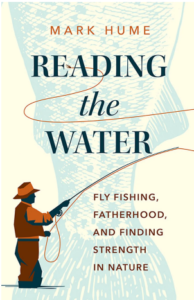Memoir sings of the natural world
When he was just a tyke, Mark Hume lived on a farm in the Okanagan Valley where “a big Barred Rock rooster … attacked any perceived threat” to his flock of hens. “Whenever he saw me,” Hume writes in Reading the Water, “he charged, and I ran.” Then one day when the rooster attacked, the boy “blindly swung a stick, struck the side of his head, and knocked him cold.” When the creature regained consciousness, “he staggered a few steps, eyes rolling, found his balance, looked at me, and ran for the henhouse.”
From then on, at first sight of the boy, the rooster would flee. Later in life, Hume writes, “I would teach my daughters always to stand up to bullies – it was a lesson I learned from a chicken.”
Anecdotes like this one remind us that the British-Columbia-based Hume has a self-deprecating sense of humour and a way with words. No surprise: He is a veteran author and journalist – four books, 7,000 articles – whose career includes 14 years covering environmental and First Nations issues for The Globe and Mail.
This book, his most ambitious yet, he subtitles Fly Fishing, Fatherhood, and Finding Strength in Nature. Using fly fishing as a controlling metaphor and working in the environmentalist tradition – more like the disciplined Roderick Haig-Brown than the outraged Farley Mowat – Hume tells his life story from boyhood through marriage and fatherhood into late middle age. He does so without being cloying or self-indulgent and while delivering a restrained jeremiad: For god’s sake, people, we must stop laying waste to our environment.
Hume breaks this meditative work into three parts. In Headwaters, he treats his origins and youth, swept along by the emergence of his passion for fly fishing. In Overflow, he turns to adulthood, telling the story of marrying, becoming a father, developing (almost in passing) a journalistic career and, above all, sharing his fly-fishing mastery with his two growing daughters. In part three, Alluvium, he relives a health scare and a serious car accident, and returns, as always, to his daughters, now young adults who are themselves expert fly fishers: “They read the water, then waded in as deep as they could, going deeper than I had gone last time.”
Repeatedly, without becoming strident or repetitive, Hume decries the “diminishment of nature” he sees all around. Over the years, he writes, he came to understand that economics drove the destruction, but “the money went to so few, and the loss was suffered by so many.” He couldn’t figure out “why society would allow forests to be clear-cut and rivers destroyed when the economic benefits were so fleeting.”
Hume musters examples. “On the Thompson River,” he writes, “steelhead stocks fell over my lifetime from a historic high of twenty thousand fish to less than two hundred. From startling abundance to a biological vanishing point in less than one human generation.”
Again, near Salmon Arm, Hume notes that in 1905, so many sockeye flooded up the Salmon River that “a fisheries officer described how the water level rose, lifting his boat, when a massive school of fish moved into the stream from the lake.” But then the settlers came and cleared the forests, removing the shade and so heating up the water.
“Spawning salmon were … netted and pitchforked out of the river to fertilize farm fields. Nature was plundered to grow hay. And further down the watershed, near the ocean, commercial fishing fleets killed salmon by the millions.”
Logging ruined the habitat, cattle stockyards leaked manure into the stream, “and corn farms sucked out millions of gallons of water to irrigate crops.” By the time Hume arrived, the flood of fish had been reduced to a trickle.
Nine months after that trip, emerging from the hospital, Maggie let him carry their newborn daughter, “tiny and wrapped tight in swaddling.” As the doors slid open, the first-time father hesitated: “Surely an official was going to stop me and ask if I knew what I was doing. Had I taken a fatherhood course? Did I know how to hold a baby? To feed a baby? To change a baby? Did I even know what to do when a baby cried?”
Obviously, he did not. But nobody stopped the young couple, “and we went out: the three of us,” into the great wild world. This is nature writing at its finest.
Ken McGoogan is the award-winning author of fifteen books.

Wonderful review. Inspiring observations. It makes me want to explore between the pages. Thank you Ken.